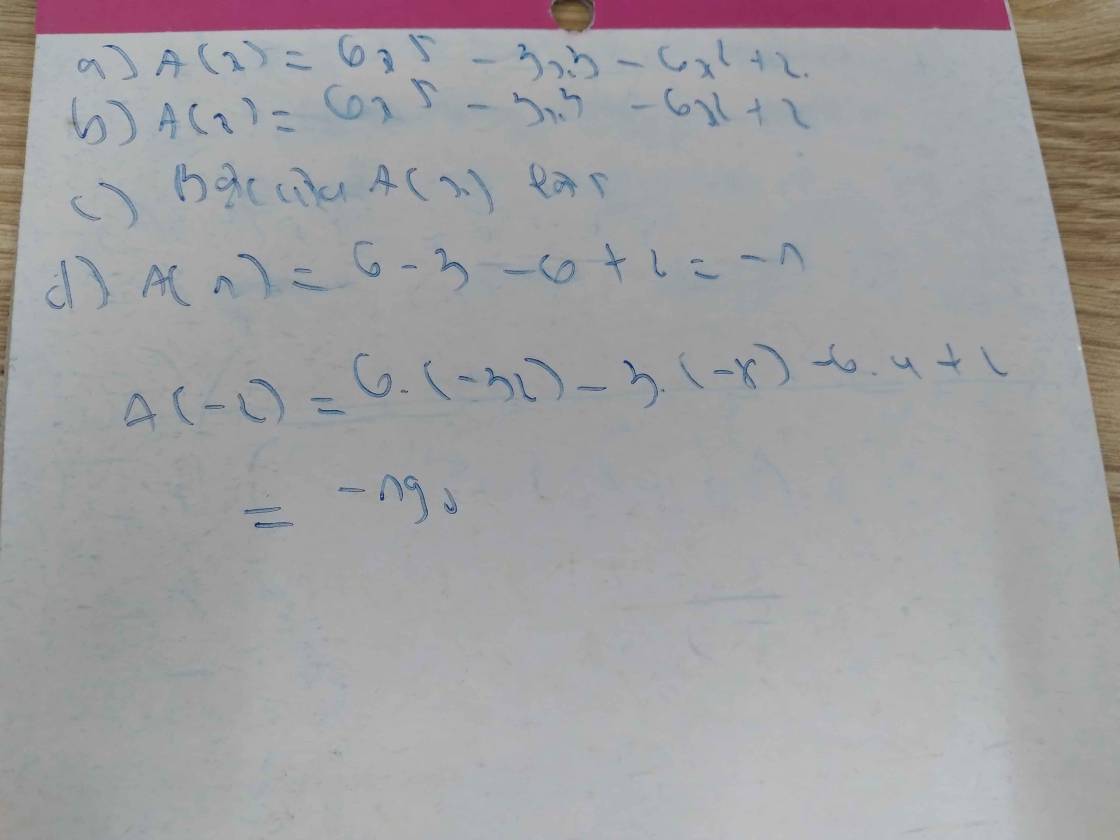Hãy nhập câu hỏi của bạn vào đây, nếu là tài khoản VIP, bạn sẽ được ưu tiên trả lời.

a/+b/\(A\left(x\right)=2x^5+2-6x^2-3x^3+4x^5\)
\(=\left(2x^5+4x^5\right)-3x^3-6x^2+2\)
\(=6x^5-3x^3-6x^2+2\)
c/Bậc của \(A\left(x\right)\) là 5
d/\(A\left(1\right)=6\cdot1^5-3\cdot1^3-6\cdot1^2+2\)
\(=6-3-6+2\)
\(=-1\)
\(A\left(-2\right)=6\cdot\left(-2\right)^5-3\cdot\left(-2\right)^3-6\cdot\left(-2\right)^2+2\)
\(=6\cdot\left(-32\right)-3\cdot\left(-8\right)-6\cdot4+2\)
\(=-192-\left(-24\right)-24+2\)
\(=-190\)

a) Ta có:
\(f\left(x\right)=2x^3-x^5+3x^4+x^2-\dfrac{1}{2}x^3+3x^5-2x^2-x^4+1\)
\(f\left(x\right)=\left(-x^5+3x^5\right)+\left(3x^4-x^4\right)+\left(2x^3-\dfrac{1}{2}x^3\right)+\left(x^2-2x^2\right)+1\)
\(f\left(x\right)=2x^5+2x^4+\dfrac{3}{2}x^3-x^2+1\)
Sắp xếp đa thức f(x) the lũy thừa giảm dần của biến, ta được:
\(f\left(x\right)=2x^5+2x^4+\dfrac{3}{2}x^3-x^2+1\)
b) Bậc của đa thức f(x) là 5
c) Ta có:
\(f\left(1\right)=2\cdot1^5+2\cdot1^4+\dfrac{3}{2}\cdot1^3-1^2+1=5,5\) . Vậy f(1) = 5,5.
\(f\left(-1\right)=2\cdot\left(-1\right)^5+2\cdot\left(-1\right)^4+\dfrac{3}{2}\cdot\left(-1\right)^3-\left(-1\right)^2+1=-1,5\). Vậy f(-1) = -1,5.

a, \(A\left(x\right)+4x^3-x=-5x^2-2x^3+5+3x^2+2x\\ \Leftrightarrow A\left(x\right)=-5x^2-2x^3+5+3x^2+2x-4x^3+x=\left(-2x^3-4x^3\right)+\left(-5x^2+3x^2\right)+\left(2x+x\right)+5\\ =-6x^3-2x^2+3x+5\)
b, \(B\left(x\right)=A\left(x\right):\left(x-1\right)=\left(-6x^3-2x^2+3x+5\right):\left(x-1\right)=-6x^2-8x-5\)
Thay \(x=-1\) vào \(B\left(x\right)\)
\(\Rightarrow-6.\left(-1\right)^2-8\left(-1\right)-5=-3\ne0\)
\(\Rightarrow x=-1\) không là nghiệm của B(x)

Bài 2 :
a, \(P\left(x\right)=2x^5+2-6x^2-3x^3+4x^2-2x+x^3+4x^5=6x^5-2x^3-2x^2+2\)
b, sắp xếp rồi, trên ý
c, Bậc : 5
Bài 3 : \(Q\left(x\right)=3x-5=0\Leftrightarrow x=\frac{5}{3}\)

Bài 1:
a) Ta có: \(P\left(x\right)=3x^4+2x^2-3x^4-2x^2+2x-5\)
\(=\left(3x^4-3x^4\right)+\left(2x^2-2x^2\right)+2x-5\)
\(=2x-5\)
Bài 1:
b)
\(P\left(-1\right)=2\cdot\left(-1\right)-5=-2-5=-7\)
\(P\left(3\right)=2\cdot3-5=6-5=1\)

A(x)=x^4+3x^4-3x^3+5x^3+2x^2-6x+x-1
=4x^4+2x^3+2x^2-5x-1

a) Ta có: P(x) = 2x5 + 2 - 6x2 - 3x3 + 4x2 - 2x + x3 + 4x5
= (2x5 + 4x5) + 2 - (6x2 - 4x2) - (3x3 - x3) - 2x
= 6x5 + 2 - 2x2 - 2x3 - 2x
b) P(x) = 6x5 - 2x3 - 2x2 - 2x + 2

1: \(A\left(x\right)=-3x^3+4x^2+4x+3\)
\(B\left(x\right)=-3x^3+4x^2-x+7\)
2: \(A-B=0\)
=>4x+3-x+7=0
=>3x+10=0
hay x=-10/3
1)
\(A=9-x^3+4x-2x^3+4x^2-6\)
\(A=(9-6)+\left(-x^3-2x^3\right)+4x+4x^2\)
\(A=3-3x^3+4x+4x^2\)
\(A=-3x^3+4x^2+4x+3\)
\(B=3+x^3+4x^2+2x^3+7x-6x^3-8x+4\)
\(B=(3+4)+(x^3+2x^3-6x^3)+4x^2+(7x-8x)\)
\(B=7-3x^3+4x^2-x\)
\(B=-3x^3+4x^2-x+7\)
2) \(A-B=(-3x^3+4x^2+4x+3)-\) \((-3x^3+4x^2-x+7)\)
\(A-B=-3x^3+4x^2+4x+3+\)\(3x^3-4x^2+x-7\)
\(A-B\) \(=\left(-3x^3+3x^3\right)+\left(4x^2-4x^2\right)+\left(4x+x\right)+\left(3-7\right)\)
\(A-B\) \(=5x-4\)
Đặt tên cho đa thức \(5x-4\) là \(H\left(x\right)\)
Cho \(H\left(x\right)=0\)
hay \(5x-4=0\)
\(5x\) \(=0+4\)
\(5x\) \(=4\)
\(x\) \(=4:5\)
\(x\) \(=\) \(0,8\)
Vậy \(x=0,8\) không phải là nghiệm của H(\(x\))
MIK KHÔNG CHẮC LÀ CÂU 2 ĐÚNG

a) và b)
A(x) = 2x⁵ + 2 - 6x² - 3x³ + 4x⁵
= (2x⁵ + 4x⁵) - 3x³ - 6x² + 2
= 6x⁵ - 3x³ - 6x² + 2
c) Bậc của A(x) là 5
d) A(1) = 6.1⁵ - 3.1³ - 6.1² + 2
= 6.1 - 3.1 - 6.1 + 2
= 6 - 3 - 6 + 2
= -1
A(2) = 6.2⁵ - 3.2³ - 6.2² + 2
= 6.32 - 3.8 - 6.4 + 2
= 192 - 24 - 24 + 2
= 146